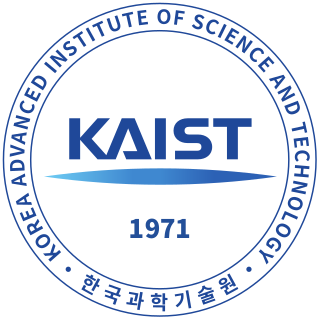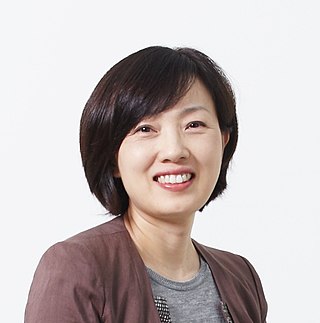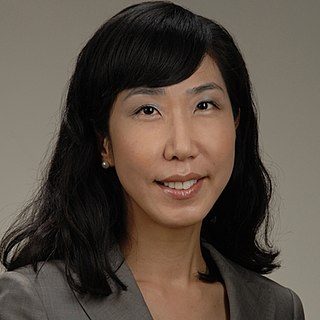
The Korea Advanced Institute of Science and Technology (KAIST) is a national research university located in Daedeok Innopolis, Daejeon, South Korea. KAIST was established by the Korean government in 1971 as the nation's first public, research-oriented science and engineering institution. KAIST is considered to be one of the most prestigious universities in the nation. KAIST has been internationally accredited in business education, and hosts the Secretariat of the Association of Asia-Pacific Business Schools (AAPBS). KAIST has 10,504 full-time students and 1,342 faculty researchers and had a total budget of US$765 million in 2013, of which US$459 million was from research contracts.

Hankuk University of Foreign Studies is a private research university based in Seoul, in South Korea. HUFS consistently ranks as one of the best universities in South Korea. The university currently teaches 45 foreign languages. In addition, it contains studies in humanities, law, political science, social sciences, business, medical science, natural sciences, and engineering.

Hongik University is a private university in Seoul, South Korea. Founded by an activist in 1946, the university is located in Mapo-gu district of central Seoul, South Korea with a second campus(branch campus) in Sejong.
Kyung Hee University is a private research university in South Korea with campuses in Seoul and Suwon. It was founded in 1949. Kyung Hee University is part of the Kyung Hee University System, which offers comprehensive education from kindergarten through graduate school.
Kim Jung-bae is an ancient historian and archaeologist, university professor emeritus, and former President of Korea University in Seoul, South Korea. Kim currently serves as the Chairman of the Goguryeo Research Society.

V. Narry Kim is a South Korean biochemist and microbiologist, best known for her work on microRNA biogenesis. Her pioneering studies have laid the groundwork for the biology of microRNA and contributed to the improvement of RNA interference technologies.

Zang-Hee Cho is a Korean neuroscientist who developed the first Ring-PET scanner and the scintillation detector BGO. More recently, Cho developed the first PET-MRI fusion molecular imaging device for neuro-molecular imaging.

Kim Seong-Kon, also known as Seong-Kon Kim, is a South Korean academic, literary critic, film critic, columnist, editor and writer.
Kim Kyu-won is a South Korean biologist.
Lee Byung-heon (Korean: 이병헌) is a professor of biochemistry and cell biology in the school of medicine at Kyungpook National University (KNU), South Korea. He received his M.D. license from Korean Medical Association in 1989. He received his B.S. from the school of medicine, KNU, in 1989, and his M.S. and Ph.D. in biochemistry from KNU in 1991 and 1995. He was an assistant professor in the school of medicine at Dongguk University in 1996–2001 and a visiting investigator in the Sanford-Burnham Medical Research Institute, La Jolla, United States, in 2001–2003. He joined KNU in 2003. He is currently a member of the Korean Society for Biochemistry and Molecular Biology, the American Association for Cancer Research, and the American Society of Molecular Imaging. His main research interest is “discovery of tissue-specific homing peptides using phage display and their applications to molecular imaging and targeted therapy”. He is currently carrying out projects for the identification of homing peptides to tumor and atherosclerotic plaque and of phosphatidylserine- and blood clotting factor XIIIa-specific peptide ligands. He has published over 30 peer-reviewed papers, book chapters, and review articles. He has also filed several patents.

Oh Uhtaek or Oh Woo-Taek is a Korean physiologist. He is also a professor at College of Pharmacy, Seoul National University. His research is largely known for Cardiac Pain and other Visceral Pain Mechanism and as well as cloning.

Kwang Soo Kim is a South Korean professor in chemistry, an adjunct professor in physics, and the director of Center for Superfunctional Materials (CSM), of Ulsan National Institute of Science and Technology (UNIST) in South Korea. He received his B.S. and M.S. degrees in Applied Chemistry from Seoul National University and also an M.S. degree in Physics from Korea Advanced Institute of Science and Technology (KAIST) (1975). He obtained his Ph.D. degree from University of California, Berkeley (1982). His research fields include Theoretical/Computational Chemistry/Physics and Experimental Nanosciences.
Sebastian Chang Hwan Kim is a Korean theologian specialized in public theology and Korean Christianity. He is currently Professor of Theology and Public Life and assistant provost for the Korean Studies Center at Fuller Theological Seminary.

Jung-Min Lee is a South Korean-American medical oncologist and physician-scientist focused on the early clinical drug development and translational studies of targeted agents in BRCA mutation-associated breast or ovarian cancer, high-grade epithelial ovarian cancer, and triple-negative breast cancer. She is a NIH Lasker Clinical Research Scholar and principal investigator in the Women's Malignancies Branch at the National Cancer Institute.
Dong-Sung Cho, is a Korean educator and scholar.

Cho Yoon-Kyoung is an interdisciplinary researcher involved in basic science to translational research in microfluidics and nanomedicine. She is a group leader in the Center for Soft and Living Matter at the Institute for Basic Science (IBS) and a full professor in Biomedical Engineering at the Ulsan National Institute of Science and Technology (UNIST), Ulsan, Korea. Cho is a member of the National Academy of Engineering of Korea and a Fellow of the Royal Society of Chemistry.

Chi Hwan Lee is an American biomedical engineer, academic, and researcher. He is the Leslie A. Geddes Associate Professor of Biomedical Engineering and associate professor of mechanical engineering, and by courtesy, of materials engineering and speech, language, and hearing sciences at Purdue University.
Wook-Dong Kim is a South Korean literary scholar, critic, and translator. He is best known to the Korean public as the translator of The Old Man and the Sea by Ernest Hemingway and To Kill a Mockingbird by Harper Lee. As a literary critic, Wook-Dong Kim has published works on literary criticism and Western critical theories, including Postmodernism, post-structuralism, and ecologism. He has also written books on translations and translation theory.










